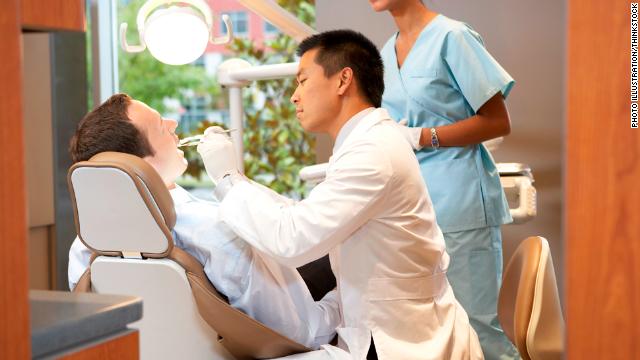| A dentist and his assistant attend to a patient. (AP Photo/M. Spencer Green, file) Newsworks.com |
Today's question
How does the Affordable Care Act affect dental care?
The short answer
It depends whether you're an adult or a kid. For adults who buy health coverage on their own or as part of a small group, dental coverage is not a mandated benefit and does not have to be included in health plans. Options may be available, but will vary from state to state and region to region. Subsidies which people may be eligible for to buy health coverage through the new marketplaces won't pertain to stand-alone dental plans, but people also won't be penalized for not having dental coverage.
What about for kids?
The Affordable Care Act expands the availability of dental coverage for people 18 and younger. So for families who may be trying to figure out whether it's cheaper to pay for that dental visit out of pocket or buy a plan, there are now more options.
In the federal marketplaces, which includes Pennsylvania, Delaware and New Jersey, pediatric dental coverage has to be available, whether that's part of a general health plan or as a free-standing dental plan. Options will vary depending on where you live.
In Delaware, for example, 13 of the 21 plans offered on the marketplace will include pediatric dental coverage, according to James Grant, the state's marketplace coordinator. "Delaware's Marketplace also offers 12 certified stand-alone dental plans, all of which must include coverage of the pediatric dental benefit."
So, are families required to buy this coverage?
Through the federal health care marketplaces, pediatric dental coverage has to be available, but people don't have to buy the coverage if it's offered as a separate plan. Families will likely have the option of purchasing a general health plan which includes pediatric dental coverage. Again, options will depend on where a person lives.
Will stand-alone dental plans be expensive?
One study has found premiums for pediatric stand-alone policies may range anywhere from $25 a month on the low end in Pennsylvania to $40 on the high end in New Jersey. The cost may also depend on what's covered by the plan. According to Colin Reusch, an analyst with the Children's Dental Health Project, the cost attributed to dental coverage offered as part of a general health plan will likely be a lot less, accounting for a few dollars a month in that overall premium.
One thing to keep in mind is that the pediatric dental coverage itself will actually change. Prior to the ACA, the dental coverage was considered a limited benefit for kids. The ACA, for example, removes an annual cap on coverage.
What about people who have coverage through their work?
For the most part, coverage won't change. As a requirement, all coverage must include a dental needs assessments for kids and doctor referrals to dentists.




